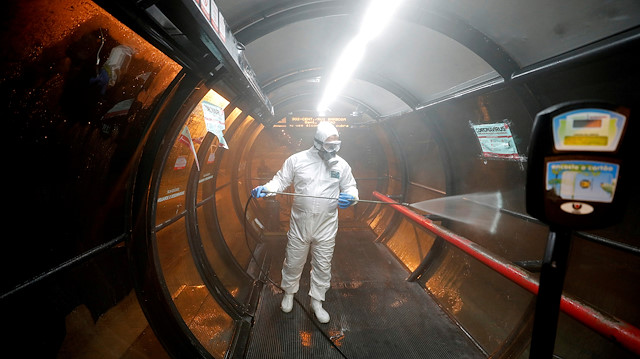

File photo
Brazil, Argentina and Colombia prepare to ease strict lockdown measures that brought their economies to standstill
After several weeks of social isolation in most countries of Latin America, some governments are planning on lifting social and economic restrictions to allow a revamp of the economy and to restore personal freedoms without reviving the spread of the coronavirus.
- Brazil
As the number of deaths caused by COVID-19 rose to 2,587 from a total of 40,743 cases in Brazil, President Jair Bolsonaro said Monday he expects isolation measures to be lifted this week.
"I hope this is the last week of quarantine, people fighting the virus staying in their houses. People have no way of staying home with an empty refrigerator," Bolsonaro told his followers as he left his official residence in Brasília.
Since the beginning of the coronavirus outbreak, Bolsonaro minimized its impact on health and stated that confinement measures cannot stop economic activity. Defying statistics that indicate Brazil is and will be the hardest-hit country in Latin America, the president replaced his health minister who was in favor of adopting isolation measures already in place in the country's main states, such as Rio de Janeiro and Sao Paulo, where state governors have extended quarantine measures for commerce, schools and all nonessential businesses until the end of April and mid-May.
- Argentina
Argentina's Health Minister Ginés González García said that the country managed to flatten the coronavirus curve by adopting a series of successive measures, such as the suspension of classes, the closing of borders and a mandatory quarantine for all residents. Argentina has 3,031 confirmed cases of coronavirus and142 fatalities.
President Alberto Fernandez ordered to loosen regulations as of Monday in areas where there is “no viral circulation” of the coronavirus. And starting on April 27, the country will begin a “targeted” quarantine, which means every province will adopt a different version of a quarantine designed by the government depending on how many infected people a region has as well as the need to reactivate the economy.
There will still be no return to classes, nor will airlines be able to resume flights yet.
- Colombia
President Ivan Duque announced on Monday night that preventive isolation actions taken in March to contain the advance of the coronavirus pandemic will be extended until May 11 in the country.
"In order to protect life and health, we must maintain the principle of isolation until May 11, but we will be doing periodic reviews," Duque said in a televised statement.
However, the government will allow specific workers in industries like manufacturing and construction to resume their activities on April 27 while steps are taken to prevent a resurgence of coronavirus.
"It is not a discussion between opening and closing [the economy]. We must say that our first responsibility is the life and health of people, but aiming to prevent the coronavirus from bringing poverty and recession," Duque said.
No domestic or international flights will be allowed for now and schools and universities will remain closed.
The numbers of the COVID-19 infections continue to rise with the Ministry of Health confirming on Monday 3,977 infected patients and 189 fatalities.
- Ecuador
Despite the increasing number of coronavirus cases (10,128), deaths (507) and problems burying the deceased, the Ecuadorian government began implementing a "regional traffic light" system that will enable the reactivation of the economy in an orderly and progressive manner.
The “traffic light” will move from red to yellow to green as business resumes in certain sectors. On Monday the lights were "in red" for all provinces, so the measures of restriction to mobility are maintained as well as a 15-hour curfew, which starts at 2 pm everyday.
- Chile
After some 50 days of quarantine, Chilean President Sebastián Piñera said his country will begin a gradual reopening of economic activities.
"We are preparing ourselves for a gradual reopening with many precautions," he said.
Piñera said nothing will be back to normal for a while.
"We are going to have to learn to get used to the fact that the normal life we had before the coronavirus is not going to return for a long time and we have to get used to a new normality," Piñera added.
Since the first case of the coronavirus appeared in the country on March 3, Chile has implemented a strategy of selective quarantines in the areas where there are more infections.
Since then, it has decreed nighttime curfews in certain places, suspended classes at all levels and ordered the closure of shopping centers, restaurants, movie theaters and bars, in addition to suspending all mass events.
The coronavirus has caused 10,507 infections and 139 deaths in the country.
- Mexico
In Mexico, a northern American nation, social distancing measures were extended until May 30 in order to control the rapid spread of the virus.
Mexican authorities informed about the easing of the lockdowns despite having 8,772 coronavirus-related cases and a death toll that remains over 700 and keeps rising.
Secretary of Health Hugo López-Gatell said Mexicans will return to their normal life on May 17.
On Monday, the United States and Mexico extended restrictions on nonessential travel across their shared border for 30 more days to prevent the spread of the coronavirus.
- Peru
More than 445 people with COVID-19 have died in Peru, but authorities say the rate of new infections has dipped. The total number of cases is now 16,325.
Although Peru has a high number of infections, people worry about food shortage. That is why the government is thinking of opening up sectors of the economy starting on April 27.
Other countries such as Bolivia and Uruguay are also considering implementing more flexible measures.
On the other hand, Dominican Republic, Panama and El Salvador with 4,964, 4,658 and 218 cases respectively, continue enforcing strict quarantine rules.
#Argentina
#Brazil
#Colombia
#Ecuador
#Jair Bolsonaro

